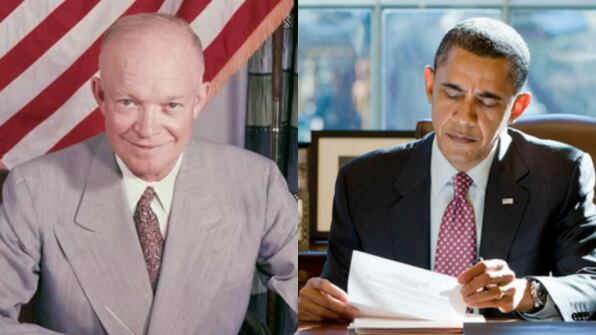
Writing in the The New Republic, Jonathan Rauch offers his own assessment of Obama's presidency, focusing on his foreign policy. According to Rauch, if you want a foreign policy in the tradition of Eisenhower or George HW Bush, you can get it with Obama:
An exception was his naïvely conceived and clumsily executed run at the Israeli-Palestinian conflict. His rookie flailing set back the peace process (such as it was) and made him look like a doormat. But he learned from his mistakes. And consider the positive side of the ledger.
Ending two wars. He has closed out the war in Iraq on acceptable terms. He is on course to do the same thing in Afghanistan. Ending two wars is a big deal.
Stabilizing relations with Russia. Russia-U.S. relations were in a tailspin when Obama entered office. Thanks to the Russia “reset,” they are stable today. Russia could certainly be more cooperative on Iran and Syria, but it is quietly helping us in Afghanistan (where it could instead be a major irritant) and generally not putting bite behind its bark.
Stabilizing relations with China. The administration built enough capital with Beijing to smuggle a prominent dissident out of the country with barely a diplomatic ripple—an extraordinary thing, if you think about it. Hardly less extraordinary is that the administration’s “Asia pivot,” which is really a move to counterbalance China, is also clicking smoothly into place.
Isolating Iran. Partly thanks to Obama’s show of willingness to negotiate, Europe is joining with the U.S. in boycotting Iranian oil, a remarkable show of solidarity behind exceptionally tough sanctions. Sanctions may yet fail, but Obama’s patient approach has weakened Iran’s position and built a consensus that will make further steps more effective. Oh, and Israel hasn’t bombed Iran and Hezbollah hasn’t bombed Israel.
Strengthening America’s brand. In Europe and most of the rest of the world (Muslim countries being important exceptions), the United States is significantly more favorably regarded than when he took office. That is bankable soft power.
Prosecuting the war on terror. Obama has been so successful at continuing and refining the most effective elements of Bush’s counterterrorism policy, while taming its provocative excesses, that Republicans don’t even want to raise the issue. Pinch me.
No, everything is not hunky-dory. And, no, a short article like this one cannot provide anything close to a textured appraisal of foreign affairs in the Obama years. But I think even a long, detailed, textured article would come in the end to two questions and two fairly clear answers. First: in foreign affairs, are we better off than we were four years ago? Answer: yes. Second: on the geopolitical scene, have we experienced any grave crises or setbacks? Answer: no. And that is why Romney has so little to say.
Or, rather, it is one reason. The other is that Obama has planted himself and the Democrats exactly where Romney, by rights, ought to be: on the kind of pragmatic realism that Republicans like Dwight Eisenhower and George H.W. Bush used to own.






